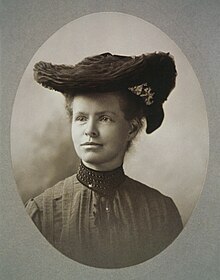Nettie Stevens | |
|---|---|
 | |
| Born | Nettie Maria Stevens July 7, 1861 Cavendish, Vermont, United States |
| Died | May 4, 1912 (aged 50) Baltimore, Maryland, United States |
| Education | Westford Academy |
| Alma mater | Westfield Normal School Stanford University (BA, MA) Bryn Mawr College (PhD) |
| Known for | XY sex-determination system |
| Scientific career | |
| Fields | Genetics |
| Institutions | Bryn Mawr College, Carnegie Institution of Washington |
| Thesis | Further studies on the ciliate Infusoria, Licnophora and Boveria (1903) |
| Doctoral advisor | Thomas Hunt Morgan |
| Doctoral students | Alice Middleton Boring |
Nettie Maria Stevens (July 7, 1861 – May 4, 1912)[1] was an American geneticist who discovered sex chromosomes. In 1905, soon after the rediscovery of Mendel's paper on genetics in 1900, she observed that male mealworms produced two kinds of sperm, one with a large chromosome and one with a small chromosome. When the sperm with the large chromosome fertilized eggs, they produced female offspring, and when the sperm with the small chromosome fertilized eggs, they produced male offspring. The pair of sex chromosomes that she studied later became known as the X and Y chromosomes.[2][3][4]
- ^ "Nettie Stevens | American biologist and geneticist". Encyclopedia Britannica. Retrieved August 12, 2019.
- ^ Brush, Stephen G. (June 1978). "Nettie M. Stevens and the Discovery of Sex Determination by Chromosomes". Isis. 69 (2): 162–172. doi:10.1086/352001. JSTOR 230427. PMID 389882. S2CID 1919033.
- ^ "Nettie Maria Stevens – DNA from the Beginning". www.dnaftb.org. Retrieved July 7, 2016.
- ^ John L. Heilbron (ed.), The Oxford Companion to the History of Modern Science, Oxford University Press, 2003, "genetics".